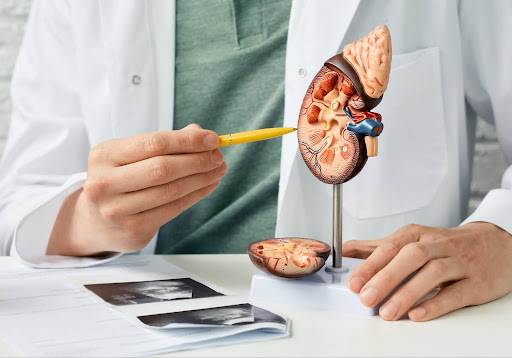
The primary function of your kidneys is to filter and clean your blood by removing excess water, salt and waste. Blood flows into your kidneys through the renal artery and is filtered through tubes called nephrons. From there, the filtered blood goes back into the rest of the body for use. Kidney cancer, also called renal cancer, is when the cells in your kidney change and grow out of control. The Kidney Cancer Association estimates there are 79,000 new kidney/renal pelvis cancer cases in the US in 2022 alone.
An Introduction To Kidney Cancer
Kidney cancer falls in the top 10 most common forms of cancer in both men and women. And although there are treatments available, understanding this disease, the types, symptoms, and risk factors is primal. At Alliance Urology, we understand the ramifications of kidney cancer and want to ensure proper education is available.
Types Of Kidney Cancer
There are several types of kidney cancer, some more common than others. According to cancer.org, 9 out of 10 kidney cancers are renal cell carcinoma (RCC). RCC develops in the lining of the kidney tubules and grows into a tumor, which is a mass of cells. RCC usually develops as a single tumor in one kidney. However, it can in some cases affect both kidneys. RCC has no definite cause, but it is most commonly found in men between 50 and 70 years old.
Even though Renal Cell Carcinoma accounts for such a large proportion of kidney cancers, there are different types, some including:
- Transitional Cell Carcinoma: Transitional cell carcinoma accounts for 6-7% of kidney cancers and affects your urinary system, including the kidneys, bladder, and the tubes that connect the two. TCC originates in the urothelial cells that line the inside of the bladder.
- Renal Sarcoma: Renal Sarcoma is and is caused by abnormal, cancerous cells growing out of control in the kidney’s connective tissue or blood vessels.
- Wilms Tumor: Wilms tumor is predominantly seen in children. Often affecting children ages 3 to 4, Wilms’ tumor is a solid cancerous tumor of the kidney and has no clear cause.
Additionally, there are over a dozen sub-types stemming from renal cell carcinoma, along with other types of cancerous kidney tumors that are non-renal cell.
Symptoms And Diagnosis
Kidney cancer may not present with any symptoms, especially in its early stages. Over time, as the cancer progresses, signs and symptoms may begin to develop. Some symptoms may include:
- Blood in your pee frequently referred to as hematuria
- A lump or mass in your kidney area
- Flank pain
- Tiredness, fatigue, or a general sense of not feeling well
- Weight loss or loss of appetite
- Low-grade fever
- Bone pain
If you have persistent pain in your flank area, a lump or mass in your kidney area, or present with any other signs or symptoms that worry you, it is always suggested you get it checked out by your doctor.
Risk Factors
It is unclear what causes most kidney cancers, however, several factors may increase your risk of developing this disease. Lifestyle factors that can increase your risk include smoking and obesity. Non-lifestyle risk factors include a family history of this type of cancer, gender, increasing age, and race.
According to the American Cancer Society, workplace exposures can increase your risk for RCC. Exposure to certain substances such as trichloroethylene, primarily used to make refrigerants and as a degreasing solvent for metal equipment, has been linked to RCC.
Treatment Decisions
Luckily, with advancements in technology and medicine, there are many options for kidney cancer treatments. Local therapies are one option that treats the tumor without harming the rest of the body. This treatment is often used for less advanced cancers. Systematic treatments use medications to destroy the cancer cells and can be given orally or through the bloodstream. Other common treatment approaches for kidney cancer include surgery, immunotherapy, or combining two or more treatments.
When it comes to kidney cancer, a urologist, who specializes in treating diseases of the urinary system, is the best fit to diagnose and treat this disease. It is important to discuss all your treatment options with your doctor to find the one best suitable for you. Here at Alliance Urology, our team has years of experience treating issues pertaining to the urinary tract, bladder, and kidneys. For questions and inquiries, visit our website, or call our office in Greensboro at (336) 274-1114.

